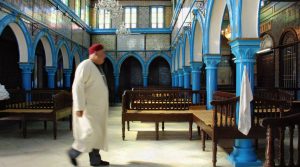
Gabe Friedman
In response to questions about antisemitism in his country posed days after a deadly synagogue shooting in Djerba, Tunisian President Kais Saied said Palestinians “are killed every day” and “no one talks about it.”
He added on Saturday during a visit to the city of Ariana that his grandfather saved Jews during World War II.
“The tents of the Nazi army were here. Jews were hiding in my grandfather’s house; they were inside the house to protect them from the Nazi army. They now talk about antisemitism,” Saied said, according to multiple outlets. “Those who distort history, manipulate the facts, conspire against the state, and seek to undermine civil peace, then level accusations of antisemitism from outer circles — in what age do they live, and why have they lost their memory?”
A coalition of over 20 non-Jewish Tunisian rights organizations immediately issued a statement that, without mentioning Saied by name, denounced what they said was “a formidable confusion between defense of the Palestinian cause and antisemitism” in Tunisian discourse.
“The undersigned associations denounce the poor management of the crisis, which has been characterized by censorship and misinformation, the minimization of the seriousness of the operation and the primacy given to its economic impact,” wrote the coalition, which includes groups such as The Tunisian Association for the Support of Minorities and the M’nemty anti-racism organization. “Ignoring its terrorist dimension, it is described as only a ‘criminal operation’ likely to ‘deal a blow to the tourist season, sow discord and bring down the state.’”
The Conference of European Rabbis, an Orthodox rabbinical group, offered a direct condemnation.
“The Conference of European Rabbis calls on European governments to condemn the inflammatory statements of President Kaies Saied of Tunisia implying that the Jews of Tunisia are responsible for the bombing of Gaza,” CER President Pinchas Goldschmidt said in a statement. “Through such wanton remarks, the president continues to incite further hatred and even attacks against the country’s Jewish community, heaven forbid. … The Tunisian President together with the relevant authorities should instead be offering support to the Jewish community and working to ensure its safety.”
Tunisia’s Chief Rabbi Haim Bitan said Tuesday that he has been invited to Saied’s palace on Wednesday, according to the Times of Israel. Goldschmidt said the community in Djerba, where the shooting took place, had not been contacted by government officials.
A security guard shot and killed five people, including two Jewish cousins from France and Israel, May 9 at the 2,500-year-old El Ghriba Synagogue on the Tunisian island of Djerba. The shooting took place during an annual Jewish pilgrimage that draws thousands from around the world on or around Lag b’Omer, a break during the 49 days of mourning between Passover and Shavuot.
In 2002, Al-Qaeda terrorists killed 21 people during the pilgrimage, which has been suspended at times over security and COVID-19 concerns. The pilgrimage had grown to draw as many as 10,000 people during the 1990s.
Nazi and Allied forces fought in Tunisia from 1942 to 1943. According to Yad Vashem, Israel’s Holocaust history authority, Vichy French and Muslim authorities were sympathetic to local Jews, whose population before the war numbered around 100,000. Most left after the foundation of Israel led to antisemitic rioting and growing hostility from the Tunisian government. Around 1,000 Jews remain on Djerba, an island of about 200 square miles.
Tunisia and Israel do not have formal diplomatic relations, but reports since the Abraham Accords between Israel and some of its Arab neighbors have claimed that Saied is mulling peace with Israel. Israeli visitors are not usually permitted in Tunisia, but authorities make an exception for the Djerba pilgrimage.



